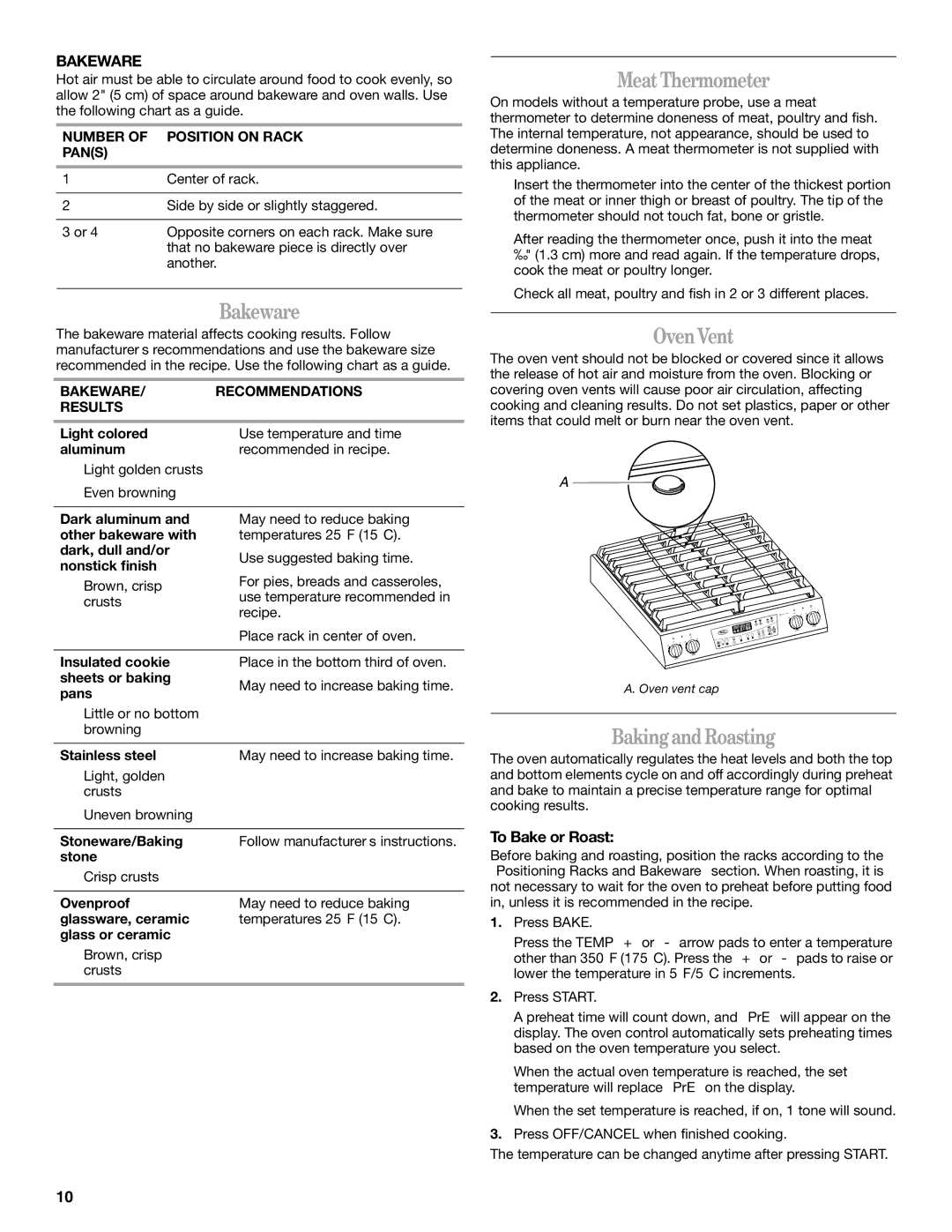
BAKEWARE
Hot air must be able to circulate around food to cook evenly, so allow 2" (5 cm) of space around bakeware and oven walls. Use the following chart as a guide.
NUMBER OF | POSITION ON RACK |
PAN(S) |
|
|
|
1 | Center of rack. |
|
|
2 | Side by side or slightly staggered. |
|
|
3 or 4 | Opposite corners on each rack. Make sure |
| that no bakeware piece is directly over |
| another. |
Bakeware
The bakeware material affects cooking results. Follow manufacturer’s recommendations and use the bakeware size recommended in the recipe. Use the following chart as a guide.
BAKEWARE/ | RECOMMENDATIONS |
RESULTS |
|
|
|
Light colored | ■ Use temperature and time |
aluminum | recommended in recipe. |
■Light golden crusts
■Even browning
Dark aluminum and | ■ | May need to reduce baking | |
other bakeware with |
| temperatures 25°F (15°C). | |
dark, dull and/or | ■ | Use suggested baking time. | |
nonstick finish | |||
■ For pies, breads and casseroles, | |||
■ Brown, crisp | |||
| use temperature recommended in | ||
crusts |
| ||
| recipe. | ||
|
| ||
| ■ Place rack in center of oven. | ||
|
|
| |
Insulated cookie | ■ | Place in the bottom third of oven. | |
sheets or baking | ■ | May need to increase baking time. | |
pans | |||
|
| ||
■Little or no bottom browning
Stainless steel | ■ May need to increase baking time. |
■Light, golden crusts
■Uneven browning
Stoneware/Baking | ■ Follow manufacturer’s instructions. | |
stone |
| |
■ | Crisp crusts |
|
|
| |
Ovenproof | ■ May need to reduce baking | |
glassware, ceramic | temperatures 25°F (15°C). | |
glass or ceramic |
| |
■ | Brown, crisp |
|
| crusts |
|
|
|
|
Meat Thermometer
On models without a temperature probe, use a meat thermometer to determine doneness of meat, poultry and fish. The internal temperature, not appearance, should be used to determine doneness. A meat thermometer is not supplied with this appliance.
■Insert the thermometer into the center of the thickest portion of the meat or inner thigh or breast of poultry. The tip of the thermometer should not touch fat, bone or gristle.
■After reading the thermometer once, push it into the meat ½" (1.3 cm) more and read again. If the temperature drops, cook the meat or poultry longer.
■Check all meat, poultry and fish in 2 or 3 different places.
Oven Vent
The oven vent should not be blocked or covered since it allows the release of hot air and moisture from the oven. Blocking or covering oven vents will cause poor air circulation, affecting cooking and cleaning results. Do not set plastics, paper or other items that could melt or burn near the oven vent.
A ![]()
![]()
A. Oven vent cap
Baking and Roasting
The oven automatically regulates the heat levels and both the top and bottom elements cycle on and off accordingly during preheat and bake to maintain a precise temperature range for optimal cooking results.
To Bake or Roast:
Before baking and roasting, position the racks according to the “Positioning Racks and Bakeware” section. When roasting, it is not necessary to wait for the oven to preheat before putting food in, unless it is recommended in the recipe.
1.Press BAKE.
Press the TEMP “+” or
2.Press START.
A preheat time will count down, and “PrE” will appear on the display. The oven control automatically sets preheating times based on the oven temperature you select.
When the actual oven temperature is reached, the set temperature will replace “PrE” on the display.
When the set temperature is reached, if on, 1 tone will sound.
3.Press OFF/CANCEL when finished cooking.
The temperature can be changed anytime after pressing START.
10
